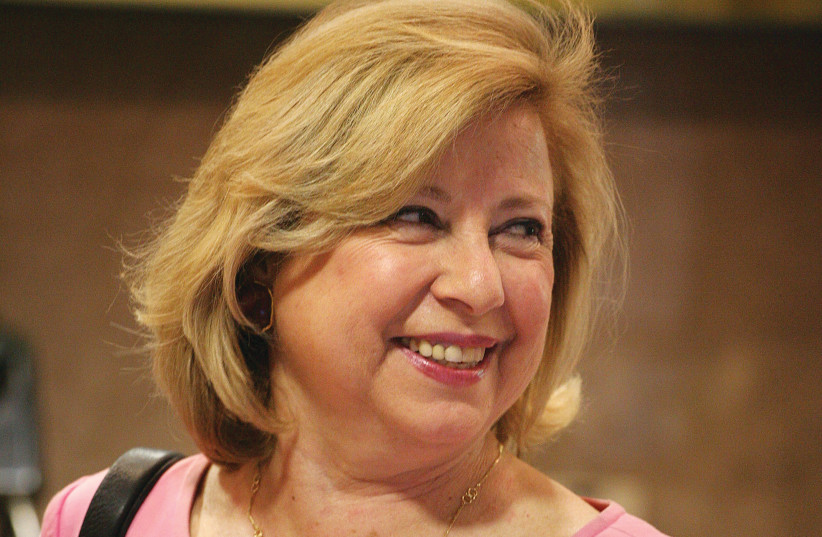Representatives from across the spectrum of Israeli governmental and social organizations met with President Isaac Herzog on Sunday ahead of this week’s International Terezin Declaration Conference in Prague.
The main event of conference will take place on Thursday, November 3, at which time the Israeli and other Jewish contingents will try to impress on representatives of 47 countries expected to attend that time is running out for achieving some modicum of justice for Holocaust survivors.
The contingents included representatives of Israel’s Foreign Ministry, Social Equality Ministry, the World Jewish Restitution Organization (WRJO), the World Jewish Congress, Holocaust remembrance organizations and institutions, Holocaust survivors and other activists in the realms of Holocaust remembrance and combating antisemitism.
Also present were European Union Ambassador to Israel Dimiter Tzantechev Czech Ambassador Martin Stropnicky.
Former MK and former ambassador Colette Avital, who is secretary-general of the WJRO, will be the keynote speaker on behalf of the organization. She is herself a child Holocaust survivor whose family, like tens of thousands of others, were deprived of their home and income, first through looting by the Nazis, and later through confiscation by communist regimes.

Holocaust restitution struggle
It was not until after the fall of communism that the WJRO in 1993 became an officially registered nonprofit organization in Israel. This followed an agreement signed in 1992 by the late Edgar Bronfman, who was president of the WJC, and Avraham Shochat, who was finance minister of Israel, Avital told Herzog.
Since then, she said, the WJRO has led countless efforts to get the countries of Eastern Europe to accept responsibility for restitution for looted and confiscated Jewish private and community property, and has received the support of the international community and international organizations. But negotiations are still being conducted, and restitution has been slow, she said. “Some countries do not want to accept responsibility.”
Shuli Davidovich, who heads the Foreign Ministry’s Bureau for World Jewish Affairs and World Religions, said that while the Foreign Ministry and the Social Equality Ministry have been working arduously on matters of property restitution, the Jewish world has presented a united front on this issue.
Israel is leading the campaign for justice for survivors, she said.
Deputy Foreign Minister Idan Roll, relating to the composition of the group that was meeting with Herzog, said maintaining Holocaust remembrance in Europe was a great challenge that – with everyone working together for a common purpose – was a challenge that could be overcome.
Social Equality Ministry Director-General Meir Bing said there was not enough knowledge or willingness in Europe to learn about the Holocaust and its significance in modern history. “We have not made sufficient progress,” he said. “We must try to exert great influence in the countries of Europe.”
“We have not made sufficient progress. We must try to exert great influence in the countries of Europe.”
Meir Bing
He expressed appreciation to the Czech government and the EU for all they have done in this regard. His sentiments were echoed by Daniel Meron, a former ambassador to the Czech Republic and currently deputy director-general for the Foreign Ministry’s Europe Division. Meron also emphasized the importance of Holocaust education.
Holocaust survivor Avraham Roth – one of a group of survivors who in September accompanied Prime Minister Yair Lapid to Germany – said that it had been very effective for survivors to share their stories.
Roth has been active in Zikaron BaSalon, an organization that promotes the sharing of Holocaust experiences with small audiences in private living rooms, made the point that this should be increasingly encouraged.
Former MK Rabbi Shmuel Halpert – who for many years has been concerned about the vandalism, destruction and abandonment of Jewish cemeteries in Europe – said he had succeeded in influencing legislation on the subject in one country, and declared that perseverance can lead to the achievement of goals.
Herzog regretted that there had been no dialogue with Eastern Europe for many years on the matter, and implied that property restitution was not only about the monetary value of property. “It has deep rooted psychological elements,” he said.
WJRO COO Mark Weitzman will also be among the speakers at the Terezin Conference.
In conversation with The Jerusalem Post just ahead of the meeting with Herzog, Weitzman said he planned to talk about the distortion of Holocaust history, not only as it applies to Jews, but also to Poland.
The WJRO has upheld Poland’s objection to references to Polish concentration camps. “There were no Polish concentration camps,” he said. “There were German concentration camps on Polish soil. At the same time, we cannot ignore the fact that there were individual Poles who collaborated with the Nazis.”
